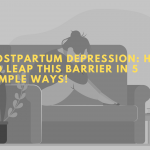Are you a woman in your 40’s?
Did you go without menstruation for months?
Do you often get irritated or frustrated on the smallest of things?
Then, It is possible that you are going through your phase of menopause and can lead yourself into depression by becoming over-anxious. Here in this article, we shall focus on how to overcome menopause depression.
But first,

What is menopause?
Menopause is a natural process for women. It occurs around the age of 40-50 years, generally at the age of 51. It’s a natural decline in the reproductive hormones and it marks the end of menstrual cycles of women. It is indicated by consecutive 12 months without any menstruation.
What is menopause depression?
Menopause depression is basically a type of mood disorder. Middle age is not an easy age. It comes with lots of responsibilities, tensions, stress, and anxiety. The stress of achieving your goals, taking care of the family, their health, and their needs, and also, taking care of your health and personal needs. All of it requires a lot of attention, energy, and time management.
This excess of anxiety can sometimes lead the women into depression especially if they can’t figure out what is exactly going on with their bodies. Hormonal changes occur and they can lead to any passive situation. Now, before knowing how to overcome menopause depression let’s first see what causes it.
Cause of menopause depression
The age of 40s & 50s does not only come with physical changes of being lethargic, back pains, and headaches but emotional changes too.
Worries about you getting old, losing family members, any past fertility issues, or children growing and going out, leaving the state for work or studies, and you not being able to catch up with a lot of friends or any financial issues. These emotional changes are not always easy to handle and can become skeptical to accept.
It is because of the hormonal changes and sudden decline in estrogen and progesterone. They are responsible for extreme mood swings and trigger feelings of stress, anxiety, loss, etc. Also, menopause has still not become one of those common things that women would talk about. So, they generally keep such issues to themselves only and then, don’t know how to overcome menopause depression. This extremity of hormonal and emotional issues is what can lead women into menopause depression.

Symptoms of menopause depression
Initially, it is very hard to diagnose menopause depression. But with time and extreme issues of anxiety, one might get the idea of it. And if you are aware of the symptoms already, you might be able to conquer the problem before it’s too late. This will be your first step towards how to overcome menopause depression.
- Irritability
- Very tired and lethargic
- Appetite changes
- Sleep problems or insomnia
- Very infrequent panic attacks
- Feeling worthless
- Loss of interest
- Being sad
- Hot flashes
- Night sweats
- Memory lapses
- Sexual disturbances
- Concentration issues
Ways on how to overcome menopause depression
If the above-stated symptoms last longer than say three weeks or a month, there is a high chance of depression that needs to be cured. For this, you should contact your health practitioner as soon as you realize menopause or experience any negative emotions or hormonal changes to seek the most suitable treatment for yourself.
- Antidepressants: Doctors or therapists might prescribe a few antidepressants to maintain the chemical imbalances. With relatively few side effects, antidepressants have been found as a great way of how to overcome menopause depression. They work best when taken alongside having psychotherapy. They also do work well in improving a few symptoms such as hot flashes.
- Psychotherapy: Therapists use psychotherapies as a means to help you with your thoughts, behaviors, and feelings. This includes regular interaction, opening up of problems and issues, personal or professional, going on in one’s life. This not only lightens up your head but also makes you find ways to deal with it. Mindful cognitive therapies are often used during this process.
- Estrogen therapy: Also known as hormone replacement therapy, is not much approved by healthcare societies. This is due to its possible but not necessary, major side effects. Yet, it proves to be very helpful. This requires taking medications to replace the estrogen that has declined due to your menopause. This treats basic symptoms of menopause such as hot flashes, vaginal discomfort, night sweats, etc.
/Menopauseanddepression-6d4076f80a7c498aaa0cd957f507c315.jpg)
If in case you are not able to contact a doctor or aren’t comfortable talking to anyone here are a few tips you can try on your own for a period of time to cure the depression. If they don’t work or are taking very long to make you feel good, the best option is to seek a doctor.
- Balanced diet: A balanced diet ensures that your body gets proper everyday nutrients and can help overcome hormonal changes. As much as your mind would want to keep an insufficient or over-sufficient diet, you should try to overcome that. With proper nutrients and a good appetite, you have the proper energy to work and put yourself to some use.
- Regular exercise: Exercises help to relieve a lot of stress off your shoulders. It makes you feel more energetic and lively. One strong and healthy exercise session can lower the symptoms of anxiety for long hours. If done efficiently and regularly, it may help eliminate the problems of anxiety completely over time.
- Relaxation techniques: Relaxing techniques as the name suggests would help you relax more and panic less. This could include meditation or yoga, whichever suits you best. Meditation helps in gaining concentration. This in return will help you channel your negative and positive thoughts according. The same is with yoga, it helps you mitigate your stress and overthinking. This is not a cure but is very helpful.
- Engage in hobby activities: Engaging in activities that are your hobbies will help you distract from the negative thoughts coming into your head. When you have something to do that you like and in a positive environment, it leaves little or no space for negativity. Once you think you are on a positive note, you can move on.
By now you know how to overcome menopause depression and can take good care of yourself before it’s too late. Menopause depression is definitely curable, and for that, the techniques mentioned above can be very helpful.








